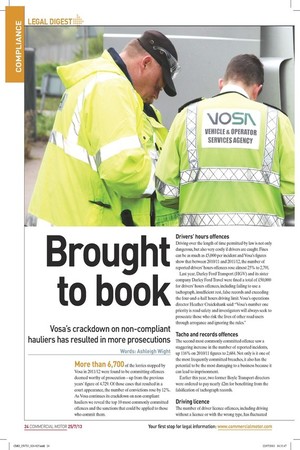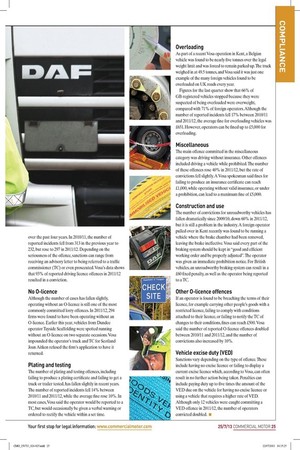Brought to book Vosa's crackdown on non-compliant hauliers has resulted
Page 20

Page 21

If you've noticed an error in this article please click here to report it so we can fix it.
in more prosecutions Words: Ashleigh Wight More than 6,700 of the lorries stopped by Vosa in 2011/12 were found to be committing offences deemed worthy of prosecution — up from the previous years' figure of 4,729. Of those cases that resulted in a court appearance, the number of convictions rose by 12%. As Vosa continues its crackdown on non-compliant hauliers we reveal the top 10 most commonly committed offences and the sanctions that could be applied to those who commit them. Drivers' hours offences Driving over the length of time permitted by law is not only dangerous, but also very costly if drivers are caught. Fines can be as much as £5,000 per incident and Vosa's figures show that between 2010/11 and 2011/12, the number of reported drivers' hours offences rose almost 25% to 2,791 Last year, Darley Ford Transport (HGV) and its sister company Darley Ford Travel were fined a total of £50,000 for drivers' hours offences, including failing to use a tachograph, insufficient rest, false records and exceeding the four-and-a-half hours driving limit. Vosa's operations director Heather Cruickshank said: "Vosa's number one priority is road safety and investigators will always seek to prosecute those who risk the lives of other road users through arrogance and ignoring the rules."
Tacho and records offences The second most commonly committed offence saw a staggering increase in the number of reported incidents, up 116% on 2010/11 figures to 2,684. Not only is it one of the most frequently committed breaches, it also has the potential to be the most damaging to a business because it can lead to imprisonment.
Earlier this year, two former Boyle Transport directors were ordered to pay nearly £2m for benefitting from the falsification of tachograph records.
Driving licence The number of driver licence offences, including driving without a licence or with the wrong type, has fluctuated over the past four years. In 2010/11, the number of reported incidents fell from 313 in the previous year to 232, but rose to 297 in 2011/12. Depending on the seriousness of the offence, sanctions can range from receiving an advisory letter to being referred to a traffic commissioner (TC) or even prosecuted. Vosa's data shows that 93% of reported driving licence offences in 2011/12 resulted in a conviction.
No 0-licence Although the number of cases has fallen slightly, operating without an 0-licence is still one of the most commonly committed lorry offences. In 2011/12,294 firms were found to have been operating without an 0-licence. Earlier this year, vehicles from Dundee operator Tayside Scaffolding were spotted running without an 0-licence on two separate occasions. Vosa impounded the operator's truck and TC for Scotland Joan Aitken refused the firm's application to have it returned.
Plating and testing The number of plating and testing offences, including failing to produce a plating certificate and failing to get a truck or trailer tested, has fallen slightly in recent years. The number of reported incidents fell 14% between 2010/11 and 2011/12, while the average fine rose 10%. In most cases, Vosa said the operator would be reported to a TC, but would occasionally be given a verbal warning or ordered to rectify the vehicle within a set time. Overloading As part of a recent Vosa operation in Kent, a Belgian vehicle was found to be nearly five tonnes over the legal weight limit and was forced to remain parked up. The truck weighed in at 49.5 tonnes, and Vosa said it was just one example of the many foreign vehicles found to be overloaded on UK roads every year.
Figures for the last quarter show that 66% of GB-registered vehicles stopped because they were suspected of being overloaded were overweight, compared with 71% of foreign operators. Although the number of reported incidents fell 17% between 2010/11 and 2011/12, the average fine for overloading vehicles was £651. However, operators can be fined up to £5,000 for overloading.
Miscellaneous The main offence committed in the miscellaneous category was driving without insurance. Other offences included driving a vehicle while prohibited. The number of these offences rose 40% in 2011/12, but the rate of convictions fell slightly. A Vosa spokesman said fines for failing to produce an insurance certificate can reach £1,000, while operating without valid insurance, or under a prohibition, can lead to a maximum fine of £5,000.
Construction and use The number of convictions for unroadworthy vehicles has fallen dramatically since 2009/10, down 60% in 2011/12, but it is still a problem in the industry. A foreign operator pulled over in Kent recently was found to be running a vehicle where the brake chamber had been removed, leaving the brake ineffective. Vosa said every part of the braking system should be kept in "good and efficient working order and be properly adjustor:Me operator was given an immediate prohibition notice. For British vehicles, an unroadworthy braking system can result in a £60 fixed penalty, as well as the operator being reported to a TC.
Other 0-licence offences If an operator is found to be breaching the terms of their licence, for example carrying other people's goods with a restricted licence, failing to comply with conditions attached to their licence, or failing to notify the TC of changes to their conditions, fines can reach £500. Vosa said the number of reported 0-licence offences doubled between 2010/11 and 2011/12, and the number of convictions also increased by 10%.
Vehicle excise duty WED) Sanctions vary depending on the type of offence. These include having no excise licence or failing to display a current excise licence which, according to Vosa, can often result in no further action being taken. Penalties can include paying duty up to five times the amount of the VED due on the vehicle for having no excise licence or using a vehicle that requires a higher rate of VED. Although only 12 vehicles were caught committing a VED offence in 2011/12, the number of operators convicted doubled. •










































